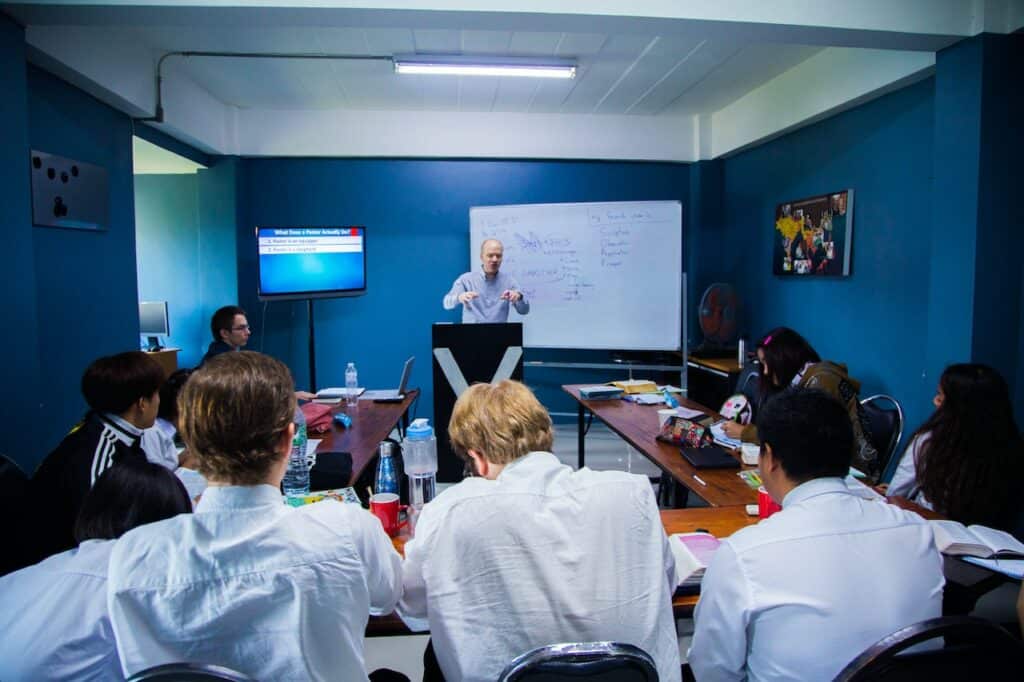Parent-teacher conferences can be nerve-wracking for both parents and teachers. It’s a time when parents get to meet with their child’s teacher and discuss their academic progress, strengths, and weaknesses. It’s also an opportunity for teachers to learn about their students’ home lives and get a better understanding of how to support them in the classroom.
Understanding Parent-Teacher Conferences Parent-teacher conferences typically happen once or twice a year, and they provide a chance for parents to discuss their child’s academic progress with their teacher. During these conferences, parents can ask questions about their child’s strengths and weaknesses, behavior in the classroom, and any concerns they may have. Teachers can also share their observations about the child’s progress and offer suggestions for how parents can support their child’s learning at home.
Preparation for the Conference Preparing for a parent-teacher conference is essential to ensure that both parties get the most out of the meeting. Parents should take the time to review their child’s progress report, homework assignments, and any other relevant materials before the conference. They should also come with a list of questions and concerns they would like to address. Teachers can prepare by reviewing the child’s academic progress and behavior in the classroom, as well as any concerns they may have.
Key Takeaways
- Parent-teacher conferences provide an opportunity for parents and teachers to discuss a child’s academic progress, strengths, and weaknesses.
- Preparation is key to getting the most out of a parent-teacher conference.
- During the conference, parents can ask questions and share concerns, while teachers can offer suggestions for supporting the child’s learning at home.
Understanding Parent-Teacher Conferences
Parent-teacher conferences are an essential part of a student’s academic journey. These conferences provide an opportunity for parents and teachers to communicate and collaborate on a student’s progress, strengths, and areas of improvement. It is a chance for parents to learn more about what their child is learning in school and how they can support their child’s education at home.

During a parent-teacher conference, the teacher will typically discuss the student’s academic performance, behavior, and social skills. They may also provide examples of the student’s work and discuss any areas where the student may need additional support. The parent can ask questions and share their concerns about their child’s progress.
To have a successful parent-teacher conference, it is essential to prepare beforehand. Parents should review their child’s recent work and grades and make a list of questions or concerns they want to discuss with the teacher. They should also be open-minded and willing to listen to the teacher’s feedback and suggestions.
During the conference, it is important to maintain a respectful and professional tone. Both the parent and teacher should be clear and concise in their communication and avoid making exaggerated or false claims. The goal of the conference is to work together to support the student’s academic and personal growth.
In summary, parent-teacher conferences are an excellent opportunity for parents and teachers to work collaboratively to support a student’s academic journey. By preparing beforehand, maintaining a respectful and professional tone, and being open-minded, parents and teachers can have a successful conference that benefits the student.
Preparation for the Conference

Setting the Agenda
Before attending a parent-teacher conference, it is important to set a clear agenda. Parents should identify the topics they want to discuss with the teacher and prioritize them based on their importance. This will help keep the conversation focused and ensure that all important concerns are addressed.
To set the agenda, parents can review their child’s recent work and grades, as well as any notes or feedback provided by the teacher. They can then develop a list of questions and concerns they would like to discuss during the conference.
Gathering Materials
To ensure a productive parent-teacher conference, parents should gather all relevant materials ahead of time. This may include their child’s recent assignments, test scores, and progress reports. Parents should also bring a notepad or recording device to take notes during the conference.
If parents have any specific concerns or questions, they should also bring relevant documentation or examples to share with the teacher. This can help provide context and facilitate a more productive conversation.
Scheduling and Logistics
Parents should also consider scheduling and logistics when preparing for a parent-teacher conference. They should review their work schedule and identify a time that works best for them. They should also consider any transportation or childcare needs that may impact their ability to attend the conference.
Once a time has been selected, parents should confirm the details with the teacher and ensure they have all necessary information, such as the location of the conference and any materials they need to bring. By taking these steps, parents can ensure they are fully prepared for the conference and can make the most of their time with the teacher.
During the Conference
Effective Communication
During parent-teacher conferences, effective communication is essential to ensure that parents and teachers are on the same page when it comes to a student’s academic progress and behavior. Teachers should use clear and concise language when discussing a student’s performance and avoid using technical jargon that may be difficult for parents to understand. Additionally, teachers should actively listen to parents’ concerns and questions and provide thoughtful responses.
Body language is also an important aspect of effective communication during parent-teacher conferences. Teachers should maintain eye contact, use open and relaxed body language, and avoid crossing their arms or legs, which can signal defensiveness.
If a parent does not speak the same language as the teacher, it is important to provide a translator to ensure effective communication.
Discussing Academic Progress
When discussing a student’s academic progress, teachers should provide specific examples of the student’s strengths and weaknesses. It is important to focus on the student’s progress rather than comparing them to other students. Teachers should also provide suggestions for how parents can support their child’s learning at home.
Addressing Behavior and Conduct
If a student’s behavior or conduct is a concern, teachers should provide specific examples of the behavior and its impact on the student’s academic progress. Teachers should also provide suggestions for how parents can support their child’s behavior at home.
Student-led Conferences
In student-led conferences, students take an active role in discussing their academic progress and goals with their parents and teachers. Teachers should provide guidance to students on how to effectively communicate their progress and goals. During these conferences, teachers should also provide feedback to students on their progress and provide suggestions for how they can continue to improve.
Overall, effective communication, a focus on academic progress and behavior, and student-led conferences can all contribute to successful parent-teacher conferences.
Post-Conference Strategies

Creating an Action Plan
After the parent-teacher conference, it is essential to create an action plan to address any concerns or issues that were discussed during the meeting. The action plan should include specific steps that the student, teacher, and parents can take to improve academic performance or address any behavioral issues.
To create an effective action plan, the teacher should:
- Identify the specific areas of concern discussed during the conference.
- Set specific, measurable goals for the student.
- Develop a plan of action that includes specific steps that the student, teacher, and parents will take to achieve these goals.
- Establish a timeline for implementing the plan and monitoring progress.
- Identify any resources that may be needed to support the plan.
By creating a clear and actionable plan, the teacher can ensure that everyone is on the same page and working towards a common goal.
Follow-up and Feedback
Following the conference, it is essential to provide feedback to the student and parents on their progress towards achieving the goals outlined in the action plan. The teacher should schedule regular follow-up meetings to discuss progress and make adjustments to the plan as needed.
During these follow-up meetings, the teacher should:
- Review progress towards the goals outlined in the action plan.
- Identify any challenges or obstacles that may be hindering progress.
- Adjust the plan as needed to address any new concerns or issues that may have arisen.
- Provide feedback to the student and parents on their efforts and progress.
By providing regular feedback and follow-up, the teacher can ensure that the action plan remains relevant and effective in addressing the student’s needs.
Understanding Academic Progress
Grades and Report Cards
Grades and report cards are important tools for parents to understand their child’s academic progress. Grades are typically based on the student’s performance on assignments, tests, quizzes, and other assessments. Report cards provide an overview of the student’s academic performance over a period of time, usually a semester or a year.
It’s important to note that grades and report cards are not the only indicators of a student’s academic growth. They should be used in conjunction with other measures, such as work samples and assessments, to give a more complete picture of the student’s progress.
Work Samples and Assignments
Work samples and assignments provide a more detailed look at a student’s academic progress. They can include anything from essays and research papers to math problems and science experiments. By reviewing work samples and assignments, parents can gain a better understanding of their child’s strengths and weaknesses.
It’s important to note that work samples and assignments should not be used as the sole measure of a student’s academic progress. They should be used in conjunction with other measures, such as grades and assessments, to give a more complete picture of the student’s progress.
Test Results and Assessments
Test results and assessments are another important measure of a student’s academic progress. They can include standardized tests, teacher-created assessments, and other types of evaluations. By reviewing test results and assessments, parents can gain a better understanding of their child’s knowledge and skills in specific subject areas.
It’s important to note that test results and assessments should not be used as the sole measure of a student’s academic progress. They should be used in conjunction with other measures, such as grades and work samples, to give a more complete picture of the student’s progress.
Supporting Your Child’s Learning

Homework and Independent Work
One of the most important things parents can do to support their child’s learning is to help them establish good homework and independent work habits. This means setting aside a designated time and place for homework, minimizing distractions, and encouraging your child to take ownership of their work.
Parents can also help their child with homework by providing guidance and support when needed, but it’s important to strike a balance between helping too much and not enough. Encouraging your child to seek out resources like textbooks, online tutorials, and study groups can also help them become more independent learners.
Motivation and Growth Mindset
Motivation and a growth mindset are essential for success in school and beyond. Parents can help support their child’s motivation by setting achievable goals, praising effort over innate ability, and encouraging a positive attitude towards challenges.
Teaching your child about the power of a growth mindset – the belief that abilities can be developed through hard work and dedication – can also help them stay motivated and resilient in the face of setbacks.
Reading and Literacy Skills
Reading and literacy skills are essential for success in all areas of life. Parents can support their child’s literacy development by reading with them regularly, providing access to a variety of reading materials, and encouraging them to ask questions and make connections.
Parents can also help their child develop strong reading and comprehension skills by modeling good reading habits, such as taking notes and summarizing main ideas, and by providing opportunities for discussion and reflection.
Math Skills
Math skills are another key component of academic success. Parents can support their child’s math development by providing opportunities for practice and reinforcement, such as playing math games or working on math problems together.
Encouraging a growth mindset towards math – the belief that anyone can learn math with enough effort and practice – can also help your child stay motivated and engaged in their math studies.
Special Education Considerations
Understanding IEPs and 504s
When meeting with parents of students with special needs, it is important to have a basic understanding of Individualized Education Plans (IEPs) and 504 Plans. These plans outline the specific accommodations and services that a student with a disability requires in order to access their education. Teachers should review the student’s IEP or 504 Plan prior to the conference to ensure that they are familiar with the accommodations and services that the student is entitled to receive.
During the conference, teachers should discuss with the parents how the student’s accommodations and services are being implemented in the classroom. They should also provide feedback on the student’s progress and discuss any concerns they may have. It is important to maintain open communication with parents throughout the school year to ensure that the student’s needs are being met.
Working with Administrators
When working with students with special needs, it is important for teachers to collaborate with administrators to ensure that the student’s needs are being met. Administrators can provide additional resources and support to help teachers implement accommodations and services in the classroom. They can also help to address any concerns or issues that may arise during the school year.
Teachers should communicate regularly with administrators to discuss the progress of students with special needs and to ensure that any necessary adjustments are made to their accommodations and services. They should also work with administrators to develop strategies to help the student succeed academically and socially.
Overall, it is important for teachers to be knowledgeable about IEPs and 504 Plans and to collaborate with administrators to ensure that the needs of students with special needs are being met. By working together, teachers and administrators can help to create a positive and inclusive learning environment for all students.
Conclusion
In conclusion, parent-teacher conferences are an important opportunity for parents and teachers to communicate about a student’s progress and needs. By following the guidelines outlined in this article, parents can effectively prepare for and participate in these meetings.
It is important for parents to come to conferences with an open mind and a willingness to listen to the teacher’s perspective. They should be prepared to ask questions and share their concerns in a respectful manner.
Teachers, on the other hand, should be prepared to provide specific examples of a student’s strengths and weaknesses, as well as suggestions for how parents can support their child’s learning at home.
Throughout the conference, both parties should strive to maintain a positive and collaborative tone, focusing on the shared goal of helping the student succeed.
By working together, parents and teachers can create a supportive and effective learning environment for students.
Frequently Asked Questions
What are some tips for parents attending a parent-teacher conference?
Parents attending a parent-teacher conference should come prepared with questions, be open to feedback, and be respectful of the teacher’s time. It’s important to listen carefully to what the teacher has to say and ask for clarification if needed. Parents should also take notes during the conference and follow up with the teacher afterward if they have any additional questions or concerns.
What are some effective ways to start a conversation during a parent-teacher conference?
Parents can start a conversation during a parent-teacher conference by introducing themselves and thanking the teacher for their time. They can then ask the teacher how their child is doing in class and if there are any areas where they can improve. It’s also helpful to ask the teacher for their recommendations on how to best support their child’s learning at home.
What are some important points to cover during a parent-teacher conference?
During a parent-teacher conference, it’s important to discuss the child’s academic progress, behavior in class, and any areas where they may need additional support. Parents should also ask about the child’s strengths and interests and how they can be further developed. It’s also important to discuss any concerns the parent may have and work together with the teacher to find solutions.
How can parents prepare for a parent-teacher conference?
Parents can prepare for a parent-teacher conference by reviewing their child’s progress reports and any assignments or tests that have been graded. They should also come up with a list of questions or concerns they have and bring a pen and paper to take notes during the conference. It’s also helpful to talk to their child beforehand and ask if there’s anything they would like the parent to discuss with the teacher.
What are some common questions to ask during a parent-teacher conference?
Some common questions to ask during a parent-teacher conference include:
How is my child doing academically?
Are there any areas where my child is struggling?
How can I best support my child’s learning at home?
What are my child’s strengths and interests?
How can we work together to address any concerns I have?
What are some ways to follow up after a parent-teacher conference?
After a parent-teacher conference, parents should review their notes and discuss any action items with their child. They should also follow up with the teacher to thank them for their time and to ask any additional questions or concerns they may have. It’s important to keep the lines of communication open and to work together to support the child’s academic and personal growth.

Iesha is a loving mother of 2 beautiful children. She’s an active parent who enjoys indoor and outdoor adventures with her family. Her mission is to share practical and realistic parenting advice to help the parenting community becoming stronger.
